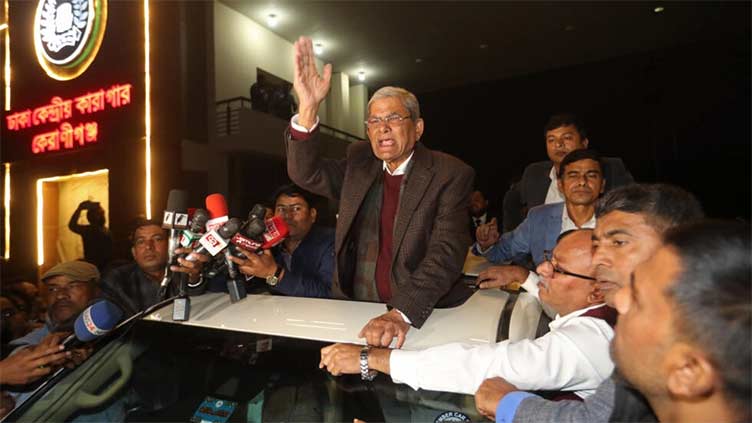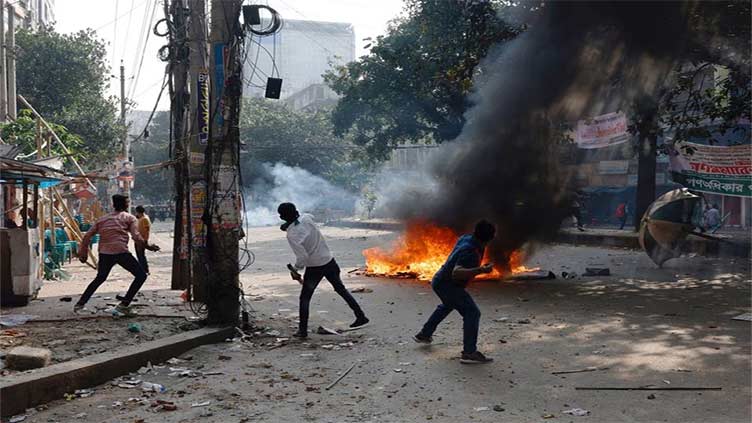Bangladesh opposition chief held after anti-PM protests

World
The police chief said BNP leader Mirza Fakhrul Islam Alamgir had been "detained for interrogation"
DHAKA (AFP/Reuters) – Bangladesh's main opposition leader was detained for questioning on Sunday morning, as clashes continued for a second day between police and protesters against the prime minister ahead of upcoming elections.
Dhaka Metropolitan Police Commissioner Habibur Rahman said the leader of the Bangladesh Nationalist Party (BNP) Mirza Fakhrul Islam Alamgir had been "detained for interrogation".
Rahman told AFP that Alamgir would be questioned over Saturday's violence in which a police officer and a protester were killed, and at least 26 police ambulances were torched or damaged.
Alamgir, 75, the BNP's secretary-general, has led the party since BNP chairwoman and two-time former premier Khaleda Zia was arrested and jailed, and her son went into exile in Britain.
The resurgent opposition has been mounting protests to press its demands for months, despite their ailing leader Zia being effectively under house arrest after a conviction on corruption charges.

Saturday's protests by BNP and the largest Islamist party, Jamaat-e-Islami, were the biggest so far this year, AFP journalists at the site said, and marked a new phase in their campaigning with a general election due before the end of January.
Rubber bullets, tear gas
More than 100,000 supporters of the two major opposition parties rallied on Saturday to demand Prime Minister Sheikh Hasina step down to allow a free and fair vote under a neutral government.
Protests descended into several hours of violent clashes in central Dhaka, and both the BNP and Jamaat-e-Islami called for a nationwide strike on Sunday to protest the violence.
Police also accused protesters of setting fire to a bus in the early hours of Sunday morning, after a blaze in which one person was killed and another badly burned.
Security on Sunday was tight in the capital with thousands of members of security forces patrolling the streets.
/cloudfront-us-east-2.images.arcpublishing.com/reuters/ZBOYKMCVPBLBXBA4RQ63XNX6UY.jpg)
Dhaka Metropolitan Police spokesman Faruq Hossain told reporters one officer had been killed and 41 others were injured in clashes with protesters.
Several journalists were attacked and injured while trying to cover the clashes, media reports said.
Police and opposition activists clashed in the industrial city of Narayanganj, police said.
Officers fired rubber bullets and tear gas at the protesters after they burned tyres on a road and tried to vandalise vehicles, district police chief Golan Mostofa Russell told AFP.
One officer was injured, police said, while local media reported two BNP protesters were also injured.
The United States on Saturday condemned the clashes and called for "calm and restraint on all sides", warning that it would consider visa restrictions on those responsible.
Hasina – daughter of the country's founding leader – has been in power for 15 years and has overseen rapid economic growth with Bangladesh overtaking neighbouring India in GDP per capita, but inflation has risen and her government is accused of corruption and human rights abuses.
Western governments have expressed concern over the political climate in Bangladesh, where Hasina's ruling Awami League dominates the legislature and runs it virtually as a rubber stamp.
Her security forces are accused of detaining tens of thousands of opposition activists, killing hundreds in extrajudicial encounters and disappearing hundreds of leaders and supporters.
Demand for resifnation
The BNP has been calling on Hasina to resign to allow elections scheduled in January to be held under a neutral caretaker government - a demand her government has so far rejected.
"Today's rally continued for hours in a perfectly disciplined and peaceful manner until all of a sudden the lobbing of tear gas shells started," senior BNP leader Abdul Moyeen Khan told Reuters.
"The intensity increased and violent attacks with sounds of blasts and shootings turned the whole place into a war zone."
The BNP has called for a dawn-to-dusk countrywide strike in protest against the police action.
/cloudfront-us-east-2.images.arcpublishing.com/reuters/3HBBW22IZJKXJEN2W5WWCMVQ4M.jpg)
"I came to protest the enforced disappearances, murders, and oppression that we have suffered for the past 15 years. This government is not safe anymore for even a second," BNP supporter Arif Khan said.
Hasina, who has maintained tight control since coming to power in 2009, has been accused of authoritarianism, human rights violations, cracking down on free speech and suppressing dissent while jailing her critics.
Her government is under pressure from the Western countries to hold "free and fair" elections.
In May, Washington said it would impose visa sanctions on Bangladeshis who undermine the democratic process at home, after accusations of vote-rigging and suppressing the opposition marred elections in 2014 and 2018. Hasina's government has denied the charges.


